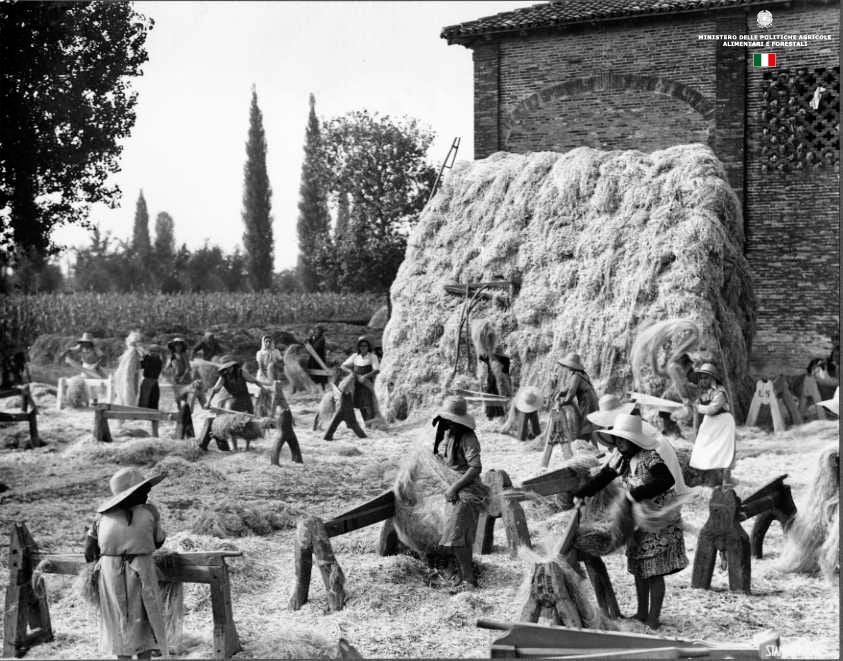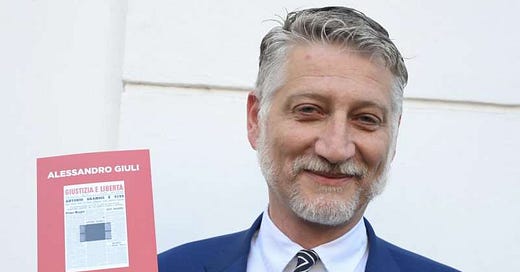What's the deal with Alessandro Giuli?
Plus, the government’s war on CBD and David Byrne's Italian playlist
If you’ve been following the Italian press over the past few days you’ll no doubt be up to speed regarding the debacle concerning Gennaro Sangiuliano, the culture minister, who got himself in hot water when it was revealed he had hired his ex-mistress Rosaria Boccia in an informal – illegal — consultancy role. By Italian standards this was a relatively low-stakes, run of the mill sleaze story. Nevertheless, despite protestations, and many sexist efforts to cast Ms. Boccia as the villain, Sangiuliano was forced to resign. On Friday, Alessandro Giuli, the outgoing director of Rome’s MAXXI museum, was selected to take up the mantle. This is a big deal. The Culture Minister has a big sway in Italy, making decisions on everything from museum management to public event spending. All of which is concerning. Sangiuliano was a relatively unambitious buffoon. Giuli is a different and arguably more dangerous kind of figure. After spending his youth in the ranks of the far-right Fronte della Gioventù he went on to study philosophy at Rome’s La Sapienza university before dropping out to pursue a career as a public intellectual and journalist with right wing tabloid Il Foglio. Giuli has published books such asThe Goose Step. The Unresolved Identity of the Post-Fascists (2007) and Gramsci is alive (2024), the latter of which sets out a conservative theory of ‘cultural hegemony’. Throughout his career Giuli has celebrated both Trump and Putin as “good patriots” but insists, nevertheless, he is “the most progressive of all conservatives.” For now it’s unclear how this cleverly-studied ambiguity will translate into future policy, but we’ll have a first taste on 19-21 September when Giuli will present his vision to international leaders at the G7 culture summit. If nothing else, it’s going to be an interesting moment…

This next story is pretty shocking: last week a video went viral on the Italian internet showing a group of doctors in Foggia’s Policlinico hospital who were forced to barricade themselves in a room as an angry mob launched an assault against the staff. The rioters were protesting against what they saw as the poor treatment of a 23-year old woman who died in the emergency room during an operation. The violent incident took place in one of poorest parts of the country, and it’s a horrible example of how strained the health system is right now. Unfortunately, however, this is not an isolated event. This week alone, two smaller scale but equally disturbing episodes took place in Puglia; another case in Foggia and another in the Francesco Ferrari hospital in Casarano. Meanwhile in Acerra, near Naples, dozens of staff were physically assaulted on Monday evening. Antonio De Palma, the president of Italy’s biggest nursing union, has called for military protection in the most affected hospitals, stating “never, in the past 10 years, has such an escalation of brutality been documented.” So far, ministers have remained largely silent about the incidents, though a statement and action plan are expected in the coming days.
Earlier this afternoon the Italian parliament passed a law which will ban the sale of ‘cannabis light’ and other recreational CBD products across the country. If you’re not up to speed, CBD is a cannabinoid component that’s officially listed as a medical product (clause Dpr 309/90), and which the British FSA actually considers a foodstuff. Currently, the Italian CBD sector is booming and it’s now worth somewhere between 40-100m euros; all of which is taxable. Despite this, government officials continue to insist that they have been forced to tackle "the illicit production and marketing of inflorescences and derivatives for recreational use in the so-called 'cannabis shops” for reasons of “public health” and “public safety.” Frankly, this is ridiculous. CDB is a far safer drug that, say, alcohol or tobacco, and consumers around the world are increasingly experimenting with a whole selection of gummies, oils, butters and other such products which are typically sold in these ‘cannabis shops’. One has to wonder, then, with so little evidence on the dangers of CBD, and so much money to gain, why the government has chosen to shoot itself in the foot in such dramatic fashion. To find out more about the specifics of this unfortunate ban, check out this story here.

Arts and Culture: My Not So Brilliant Friend
The final season of HBO’s adaptation of Elena Ferrante’s Neapolitan novels dropped this week, and based on the first wave of reviews it’s going to be a triumphant finale. Season four of My Brilliant Friend follows the plot of ‘The Story of the Lost Child’, arguably the strongest in the original series of books. With Lenu and Lena older now, approaching middle age, the on-screen duo of Margherita Mazzucco and Gaia Girace have been replaced by Alba Rohrwacher and Irene Maiorino; two talented actors who, from a first look, seem well-suited to the roles. As with the previous adaptions, the plot follows Ferrante’s narrative almost page-by-page. We’ll watch as Lenu’s marriage collapses, and she struggles to re-define her identity as a woman and semi-successful novelist. Lila will face-up to the violence of the Solara family in Naples, confronting her disappointments as a mother and a career woman along the way. By the finale — as Ferrante readers will no doubt be aware — the two friends end up having drifted tragically, irreconcilably, apart. This series is being released episode by episode, week by week, so you’ll have the old school pleasure of following the story as it unfolds in increments. Check out the trailer below or head to an HBO-associated streaming service to watch the first full episode.
A bit of weekend listening now, courtesy of David Byrne, the Scottish-American musician, writer, visual artist, and filmmaker. Byrne is best known for his work as frontman of the Talking Heads, but he’s also an avid DJ and song selector and he has a particular talent for compiling together some really fantastic ‘deep cut’ mixes. His latest playlist ‘David Byrne Radio Presents: Italy Sings’ is a “personal” compilation of “rock bands, opera singers, DJs, rappers and EDM artists…and some pop artists who won prizes at the San Remo festival and topped the Italian charts for years.” More specifically, Byrne hones-in on artists who “sound like no one else” including, among others, Paolo Conte, Fabrizio De André, Jovanotti and Carmen Consoli; the genres too, are dizzying, including pizzica, folk, trap and contemporary hip-hop. These are songs that, for Byrne, “could only have come from Italy,” and I’m inclined to agree. Check out the mixed version for free on his website here, or stream the track-by-track playlist on Spotify using the link below.
Recipe of the week: Braised sausage with wine and grapes
Autumn is at the door. The days are shortening and the weather is finally, finally starting to cool down. It’s the season of the vendemmia - the grape harvest - and our local winemaker here in Fiesole, Bibi Graetz, is busy coordinating the first pressing in our now aromatically perfumed central square. This week’s recipe could therefore only be a tribute to this beautiful moment in Italy’s agricultural calendar. Salsiccia all’uva. Braised sausage with wine and grapes. This is a simple dish, something eaten in most of the country’s twenty regions. There’s no campanilismo baggage here or weird hyper-local prescriptivism. This is a low-key September mid-week meal that thousands of Italians eat every year in some variation or other. My go-to recipe comes from Letitia Clark who published a delicious version in her latest book Wild Figs and Fennel: A Year in an Italian Kitchen. The elements are almost spartan – sausage, grapes and Sardinian vernaccia, that’s it - but the result is a great mix of sweet and savoury flavours that’s pretty exciting for the palate. Serve with bread and some braised greens for a filling, satisfying dinner.

I’m Jamie Mackay, a UK-born, Italy-based writer, working at the interfaces of journalism, criticism, poetry, fiction, philosophy, travelogue and cultural-history. I set up ‘The Week in Italy’ to make a space to share a regular overview of the debates and dilemmas, innovations and crises that sometimes pass under the radar of our overcrowded news feeds, to explore politics, current affairs, books, arts and food. If you’re a regular reader, and you enjoy these updates, I hope you’ll consider becoming a supporter for EUR 5.00 per month. I like to think of it as a weekly catch-up chat over an espresso. Alternatively, if you’d like to send a one-off something, you can do so via PayPal using this link. Grazie!


